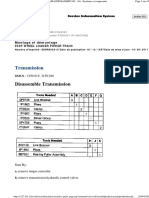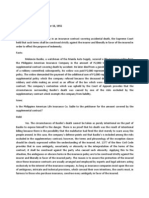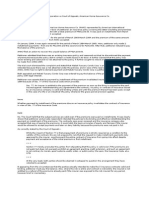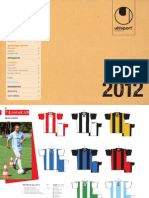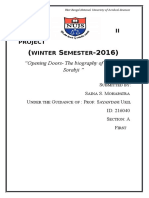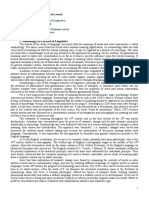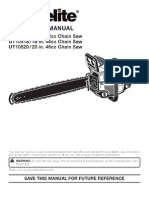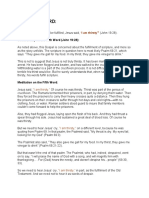0 ratings0% found this document useful (0 votes)
378 viewsAmerican Home Assurance V Tantuco Digest
American Home Assurance V Tantuco Digest
Uploaded by
Alexis Anne P. ArejolaThe respondent owned two oil mills that were insured under separate fire insurance policies issued by the petitioner. A fire destroyed the new oil mill, but the petitioner denied the insurance claim, arguing that the policy referred to a different building. The Court of Appeals found for the respondent, determining that the parties intended to insure the new oil mill despite the misdescription. In construing insurance policies, courts will interpret them liberally and in favor of coverage if possible, considering the overall intent and purpose of the contract.
Copyright:
© All Rights Reserved
Available Formats
Download as DOCX, PDF, TXT or read online from Scribd
American Home Assurance V Tantuco Digest
American Home Assurance V Tantuco Digest
Uploaded by
Alexis Anne P. Arejola0 ratings0% found this document useful (0 votes)
378 views1 pageThe respondent owned two oil mills that were insured under separate fire insurance policies issued by the petitioner. A fire destroyed the new oil mill, but the petitioner denied the insurance claim, arguing that the policy referred to a different building. The Court of Appeals found for the respondent, determining that the parties intended to insure the new oil mill despite the misdescription. In construing insurance policies, courts will interpret them liberally and in favor of coverage if possible, considering the overall intent and purpose of the contract.
Original Description:
American Home Assurance v Tantuco Digest
Original Title
American Home Assurance v Tantuco Digest
Copyright
© © All Rights Reserved
Available Formats
DOCX, PDF, TXT or read online from Scribd
Share this document
Did you find this document useful?
Is this content inappropriate?
The respondent owned two oil mills that were insured under separate fire insurance policies issued by the petitioner. A fire destroyed the new oil mill, but the petitioner denied the insurance claim, arguing that the policy referred to a different building. The Court of Appeals found for the respondent, determining that the parties intended to insure the new oil mill despite the misdescription. In construing insurance policies, courts will interpret them liberally and in favor of coverage if possible, considering the overall intent and purpose of the contract.
Copyright:
© All Rights Reserved
Available Formats
Download as DOCX, PDF, TXT or read online from Scribd
Download as docx, pdf, or txt
0 ratings0% found this document useful (0 votes)
378 views1 pageAmerican Home Assurance V Tantuco Digest
American Home Assurance V Tantuco Digest
Uploaded by
Alexis Anne P. ArejolaThe respondent owned two oil mills that were insured under separate fire insurance policies issued by the petitioner. A fire destroyed the new oil mill, but the petitioner denied the insurance claim, arguing that the policy referred to a different building. The Court of Appeals found for the respondent, determining that the parties intended to insure the new oil mill despite the misdescription. In construing insurance policies, courts will interpret them liberally and in favor of coverage if possible, considering the overall intent and purpose of the contract.
Copyright:
© All Rights Reserved
Available Formats
Download as DOCX, PDF, TXT or read online from Scribd
Download as docx, pdf, or txt
You are on page 1of 1
AMERICAN HOME ASSURANCE COMPANY vs. TANTUCO ENTERPRISES, INC. G.R.
No. 138941 October 8, 2001
FACTS:
Respondent Tantuco Enterprises, Inc. is engaged in the coconut oil milling and refining
industry. It owns two oil mills which were separately covered by fire insurance policies
issued by petitioner American Home Assurance Co., Philippine Branch. The first oil mill
was insured for P3,000,000.00 under Policy No. 306- 7432324-3 for the period March 1,
1991 to 1992. The new oil mill was insured for P6,000,000.00 under Policy No. 306-
7432321-9 for the same term. Official receipts indicating payment for the full amount of
the premium were issued by the petitioner's agent. A fire that broke out in the early
morning of September 30,1991 gutted and consumed the new oil mill. Respondent
immediately notified the petitioner of the incident but petitioner rejected respondent's
claim for the insurance proceeds on the ground that no policy was issued by it covering
the burned oil mill. It stated that the description of the insured establishment referred to
another building thus: "Our policy nos. 306-7432321-9 (Ps 6M) and 306-7432324-4 (Ps
3M) extend insurance coverage to your oil mill under Building No. 5, whilst the affected
oil mill was under Building No. 14. "
ISSUE: Whether or not the Court of Appeals erred in its legal interpretation of 'Fire
Extinguishing Appliances Warranty' of the policy.
HELD: In construing the words used descriptive of a building insured, the greatest
liberality is shown by the courts in giving effect to the insurance. In view of the custom of
insurance agents to examine buildings before writing policies upon them, and since a
mistake as to the identity and character of the building is extremely unlikely, the courts
are inclined to consider that the policy of insurance covers any building which the parties
manifestly intended to insure, however inaccurate the description may be.
Notwithstanding, therefore, the misdescription in the policy, it is beyond dispute, to our
mind, that what the parties manifestly intended to insure was the new oil mill. If the parties
really intended to protect the first oil mill, then there is no need to specify it as new. In
determining what the parties intended, the courts will read and construe the policy as a
whole and if possible, give effect to all the parts of the contract, keeping in mind always,
however, the prime rule that in the event of doubt, this doubt is to be resolved against the
insurer. In determining the intent of the parties to the contract, the courts will consider the
purpose and object of the contract.
You might also like
- Dela Fuente v. Fortune Life Insurance Co., Inc., - BATAANDocument2 pagesDela Fuente v. Fortune Life Insurance Co., Inc., - BATAANJulia Kristia100% (1)
- Legal Aspect in NursingDocument11 pagesLegal Aspect in Nursingdpenaflor100% (7)
- Sps. Cha v. CA (Digest)Document1 pageSps. Cha v. CA (Digest)Tini GuanioNo ratings yet
- Rizal Surety vs. CA DigestDocument1 pageRizal Surety vs. CA DigestMarconni B. AndresNo ratings yet
- Cat Transmission 950F PDF - PDFDocument43 pagesCat Transmission 950F PDF - PDFMehdi Chakroune100% (3)
- Malayan Insurance Co. Vs ArnaldoDocument2 pagesMalayan Insurance Co. Vs ArnaldoRenz AmonNo ratings yet
- The Insular Life Assurance Company Vs EbradoDocument2 pagesThe Insular Life Assurance Company Vs Ebradomuyrong100% (4)
- Biagtan v. Insular LifeDocument2 pagesBiagtan v. Insular LifeIldefonso Hernaez100% (2)
- UCPB General Insurance V Masagana TelemartDocument3 pagesUCPB General Insurance V Masagana TelemartArtemisTzy100% (2)
- Lampano Vs JoseDocument1 pageLampano Vs JoseJayson CamasuraNo ratings yet
- Paz Constantino V Asia Life - GR No l1669Document2 pagesPaz Constantino V Asia Life - GR No l1669Christopher Jan DotimasNo ratings yet
- Biagtan V Insular DigestDocument1 pageBiagtan V Insular DigestMcon RlordinarioNo ratings yet
- Geagonia vs. Court of Appeals DigestDocument2 pagesGeagonia vs. Court of Appeals DigestKaren Jane Palmiano100% (2)
- American Home Vs TantucoDocument3 pagesAmerican Home Vs TantucoJoel MilanNo ratings yet
- East Furniture Inc. Vs Globe and RutgersDocument2 pagesEast Furniture Inc. Vs Globe and RutgersMan2x Salomon100% (1)
- Dela Cruz v. Capital Insurance DigestDocument2 pagesDela Cruz v. Capital Insurance DigestKenny Espi100% (1)
- Go vs. Redfern (72 Phil 71)Document1 pageGo vs. Redfern (72 Phil 71)Kai TehNo ratings yet
- Shafer v. Judge of OlongapoDocument1 pageShafer v. Judge of OlongapoarctikmarkNo ratings yet
- Prudential Guarantee and Assurance v. Trans-Asia Shipping LinesDocument1 pagePrudential Guarantee and Assurance v. Trans-Asia Shipping LinesAiza OrdoñoNo ratings yet
- Philippine Phoenix Surety & Insurance, Inc. Vs Woodworks, Inc Digest - MungcalDocument1 pagePhilippine Phoenix Surety & Insurance, Inc. Vs Woodworks, Inc Digest - Mungcalc2_charishmungcalNo ratings yet
- Choa Tiek Seng V Ca DigestDocument2 pagesChoa Tiek Seng V Ca Digestjey_d100% (2)
- Calanoc v. Court of AppealsDocument1 pageCalanoc v. Court of AppealsRebecca ChanNo ratings yet
- 70 Malayan Insurance Co. v. ArnaldoDocument3 pages70 Malayan Insurance Co. v. ArnaldoAnthony ChoiNo ratings yet
- Saturnino Vs PhilamlifeDocument1 pageSaturnino Vs PhilamlifeAnnabelle BustamanteNo ratings yet
- Tibay vs. Court of AppealsDocument1 pageTibay vs. Court of AppealsVanya Klarika NuqueNo ratings yet
- Fireman V JamilaDocument2 pagesFireman V JamilaAnonymous XvwKtnSrMRNo ratings yet
- Filipino Merchants Insurance v. CA DigestDocument2 pagesFilipino Merchants Insurance v. CA DigestMan2x Salomon100% (2)
- UCPB Vs MasaganaDocument1 pageUCPB Vs MasaganaAthena SantosNo ratings yet
- Development Bank of The Phils v. CADocument3 pagesDevelopment Bank of The Phils v. CALance LagmanNo ratings yet
- Pioneer V Yap DigestDocument2 pagesPioneer V Yap DigestKath100% (1)
- Oriental Assurance Corporation vs. CADocument2 pagesOriental Assurance Corporation vs. CAAnny YanongNo ratings yet
- 2 Pacific Banking Corporation V CA and Oriental AssuranceDocument3 pages2 Pacific Banking Corporation V CA and Oriental AssuranceKokoNo ratings yet
- 51 - McGuire v. The Manufacturers Life InsuranceDocument2 pages51 - McGuire v. The Manufacturers Life InsuranceperlitainocencioNo ratings yet
- Bachrach v. British American InsuranceDocument3 pagesBachrach v. British American InsuranceDominique PobeNo ratings yet
- Capital Insurance Vs RonquilloDocument2 pagesCapital Insurance Vs RonquilloAnonymous 5MiN6I78I0100% (1)
- Paramount Insurance v. RemondeulazDocument1 pageParamount Insurance v. RemondeulazJay-ar Rivera BadulisNo ratings yet
- Insurance Country Bankers Vs LiangaDocument2 pagesInsurance Country Bankers Vs LiangaKaye de Leon0% (1)
- First Integrated Insurance vs. HernandoDocument1 pageFirst Integrated Insurance vs. HernandoOscar E ValeroNo ratings yet
- Cebu Shipyard V William LinesDocument1 pageCebu Shipyard V William LinescrisNo ratings yet
- Philippine Phoenix Surety Vs WoodworkDocument4 pagesPhilippine Phoenix Surety Vs WoodworkSamael MorningstarNo ratings yet
- Geagonia v. Court of Appeals G.R. No. 114427 - February 6, 1995 - Davide, JR., J. FactsDocument2 pagesGeagonia v. Court of Appeals G.R. No. 114427 - February 6, 1995 - Davide, JR., J. FactsCrissyNo ratings yet
- Lalican v. Insular Life G.R. No. 183526 August 25 2009Document3 pagesLalican v. Insular Life G.R. No. 183526 August 25 2009Abilene Joy Dela CruzNo ratings yet
- Eternal Gardens Memorial Park Corp. vs. Philippine American Life Insurance CompanyDocument1 pageEternal Gardens Memorial Park Corp. vs. Philippine American Life Insurance CompanyEarl LarroderNo ratings yet
- Great Pacific Life Insurance v. CADocument2 pagesGreat Pacific Life Insurance v. CAErxha LadoNo ratings yet
- UCPB v. Masagana TelamartDocument2 pagesUCPB v. Masagana Telamartkmand_lustregNo ratings yet
- Pan Malayan Insurance Co. vs. CA, G.R. No. 95070, September 5, 1991Document2 pagesPan Malayan Insurance Co. vs. CA, G.R. No. 95070, September 5, 1991Miley LangNo ratings yet
- Great Pacific Life Assurance Corp. v. CA, 1999, 1979Document2 pagesGreat Pacific Life Assurance Corp. v. CA, 1999, 1979Randy SiosonNo ratings yet
- Gulf Resorts Inc. v. Philippine Charter Insurance Corporation DigestDocument2 pagesGulf Resorts Inc. v. Philippine Charter Insurance Corporation DigestCaroline A. Legaspino100% (2)
- Gulf Resorts Inc Vs Philippine Charter Insurance CorpDocument2 pagesGulf Resorts Inc Vs Philippine Charter Insurance CorpJ. LapidNo ratings yet
- Andrew Palermo VsDocument2 pagesAndrew Palermo VsAliyah SandersNo ratings yet
- Cebu Shipyard and Engineering Works, Inc. v. William Lines - IBP Zamboanga Del Norte ChapterDocument4 pagesCebu Shipyard and Engineering Works, Inc. v. William Lines - IBP Zamboanga Del Norte ChapterZainne Sarip BandingNo ratings yet
- 67 - Summit Guaranty and Insurance v. de GuzmanDocument1 page67 - Summit Guaranty and Insurance v. de GuzmanperlitainocencioNo ratings yet
- MALAYAN INSURANCE CO., InC. vs. Alberto Case Digest (Subrogation) 2012Document2 pagesMALAYAN INSURANCE CO., InC. vs. Alberto Case Digest (Subrogation) 2012Sam LeynesNo ratings yet
- Federal Express Corporation vs. American Home Assurance CompanyDocument2 pagesFederal Express Corporation vs. American Home Assurance Companydelbertcruz50% (2)
- VDA de Maglana vs. ConsolacionDocument1 pageVDA de Maglana vs. ConsolacionJoel FerrerNo ratings yet
- Digest - UCPB Vs Masagana, GR No. 137172Document1 pageDigest - UCPB Vs Masagana, GR No. 137172ladygeorginaNo ratings yet
- Digest of Fortune Insurance and Surety Co. v. CA (G.R. No. 115278)Document2 pagesDigest of Fortune Insurance and Surety Co. v. CA (G.R. No. 115278)Rafael Pangilinan100% (1)
- 05 Calanoc v. CADocument1 page05 Calanoc v. CAkmand_lustregNo ratings yet
- Makati Tuscany Condominium Corporation Vs Court of AppealsDocument1 pageMakati Tuscany Condominium Corporation Vs Court of AppealssappNo ratings yet
- American Home Assurance CoDocument1 pageAmerican Home Assurance CoAnonymous vAVKlB1No ratings yet
- American Home VS TantucoDocument1 pageAmerican Home VS Tantucoiamnumber_fourNo ratings yet
- American Home Assurance Company vs. Tantuco Enterprises, Inc., (G.R. No. 138941. October 8, 2001) FactsDocument2 pagesAmerican Home Assurance Company vs. Tantuco Enterprises, Inc., (G.R. No. 138941. October 8, 2001) FactsPatricia Anne GonzalesNo ratings yet
- Municipality of Makati Vs CA DigestDocument1 pageMunicipality of Makati Vs CA DigestAlexis Anne P. ArejolaNo ratings yet
- Etsi Guidelines For Antitrust Compliance PDFDocument8 pagesEtsi Guidelines For Antitrust Compliance PDFAlexis Anne P. ArejolaNo ratings yet
- Cases 7.8.2019 PDFDocument153 pagesCases 7.8.2019 PDFAlexis Anne P. ArejolaNo ratings yet
- PaleDocument69 pagesPaleAlexis Anne P. ArejolaNo ratings yet
- PALE CasesDocument110 pagesPALE CasesAlexis Anne P. ArejolaNo ratings yet
- Rules of Admissibility CasesDocument103 pagesRules of Admissibility CasesAlexis Anne P. ArejolaNo ratings yet
- Complying With Competition LawDocument28 pagesComplying With Competition LawAlexis Anne P. ArejolaNo ratings yet
- Separate Opinions Gokongwei V SECDocument10 pagesSeparate Opinions Gokongwei V SECAlexis Anne P. ArejolaNo ratings yet
- Other RulesDocument15 pagesOther RulesAlexis Anne P. ArejolaNo ratings yet
- G.R. No. 166471 March 22, 2011 Tawang Multi-Purpose COOPERATIVE Petitioner, La Trinidad Water District, RespondentDocument36 pagesG.R. No. 166471 March 22, 2011 Tawang Multi-Purpose COOPERATIVE Petitioner, La Trinidad Water District, RespondentAlexis Anne P. ArejolaNo ratings yet
- Us V Purganan DigestDocument3 pagesUs V Purganan DigestAlexis Anne P. ArejolaNo ratings yet
- Jam V IfcDocument36 pagesJam V IfcAlexis Anne P. ArejolaNo ratings yet
- Globe V. NTC G.R. No. 143964. July 26, 2004 FactsDocument17 pagesGlobe V. NTC G.R. No. 143964. July 26, 2004 FactsAlexis Anne P. ArejolaNo ratings yet
- Facts:: State Prosecutors Vs MuroDocument26 pagesFacts:: State Prosecutors Vs MuroAlexis Anne P. ArejolaNo ratings yet
- Hilado and Hilado For Appellants. Parreño, Parreño, and Carreon For Appellees. Hizon and Arboleda For Petitioner Manuel CuisonDocument27 pagesHilado and Hilado For Appellants. Parreño, Parreño, and Carreon For Appellees. Hizon and Arboleda For Petitioner Manuel CuisonAlexis Anne P. ArejolaNo ratings yet
- Transpo DigestsDocument23 pagesTranspo DigestsAlexis Anne P. ArejolaNo ratings yet
- Cuevaz v. Muñoz (G.R. No. 140520 December 18, 2000) FactsDocument3 pagesCuevaz v. Muñoz (G.R. No. 140520 December 18, 2000) FactsAlexis Anne P. ArejolaNo ratings yet
- El Salvador V Honduras SummaryDocument3 pagesEl Salvador V Honduras SummaryAlexis Anne P. Arejola100% (1)
- First Published in The City of Makati", and in Par. 2.04.1, That "This Caricature Was Printed and First Published in The City of Makati"Document45 pagesFirst Published in The City of Makati", and in Par. 2.04.1, That "This Caricature Was Printed and First Published in The City of Makati"Alexis Anne P. ArejolaNo ratings yet
- PH Competition ActDocument11 pagesPH Competition ActAlexis Anne P. ArejolaNo ratings yet
- Be It Enacted by The Senate and House of Representatives of The Philippines in Congress AssembledDocument37 pagesBe It Enacted by The Senate and House of Representatives of The Philippines in Congress AssembledAlexis Anne P. ArejolaNo ratings yet
- Evid CasesDocument65 pagesEvid CasesAlexis Anne P. ArejolaNo ratings yet
- 73113521758Document1 page73113521758Alexis Anne P. ArejolaNo ratings yet
- Tirol & Tirol For Petitioner. Enojas, Defensor & Teodosio Cabado Law Offices For Private RespondentDocument10 pagesTirol & Tirol For Petitioner. Enojas, Defensor & Teodosio Cabado Law Offices For Private RespondentAlexis Anne P. ArejolaNo ratings yet
- Sample Article FormatDocument19 pagesSample Article FormatMis. Occ. - Mariefe MarquitaNo ratings yet
- Specific Performance MS 1 To 16Document16 pagesSpecific Performance MS 1 To 16Nur AqilahNo ratings yet
- Realism 2. Surrealism 3. Abstract 4. Dadaism 5. Impressionism 6. Pointillism 7. Fantasy 8. Pop ArtDocument8 pagesRealism 2. Surrealism 3. Abstract 4. Dadaism 5. Impressionism 6. Pointillism 7. Fantasy 8. Pop ArtTerence GadilNo ratings yet
- E4l Beg Gapped Ep3Document1 pageE4l Beg Gapped Ep3Alan FerreiraNo ratings yet
- Chapter 2Document6 pagesChapter 2Nikoleta RudnikNo ratings yet
- Year 5 6 Reading Extract and Questions The Railway Children 1Document3 pagesYear 5 6 Reading Extract and Questions The Railway Children 1Mylie RobertsNo ratings yet
- Kitchens by TaufiqDocument4 pagesKitchens by TaufiqMirza Naveed Akhtar86% (28)
- Lab - Unit 5 - It Act 2000Document15 pagesLab - Unit 5 - It Act 2000Disha MohantyNo ratings yet
- E-Program Book IIGCE 2019 110819Document245 pagesE-Program Book IIGCE 2019 110819rizkiNo ratings yet
- Index Esignal Malam - One SheetDocument6 pagesIndex Esignal Malam - One SheetRidwanKrisnadiNo ratings yet
- Mathematics Chapter 1 Class 9 PDFDocument1 pageMathematics Chapter 1 Class 9 PDFrakhi goyalNo ratings yet
- SINAMICS G120. Moduły Mocy PM240. Instrukcja Obsługi - 03 - 2010 PL SINAMICS. Answers For Industry. - PDF Darmowe PobieranieDocument14 pagesSINAMICS G120. Moduły Mocy PM240. Instrukcja Obsługi - 03 - 2010 PL SINAMICS. Answers For Industry. - PDF Darmowe PobieraniekutasNo ratings yet
- Fishbone and Feather StitchDocument26 pagesFishbone and Feather StitchMarycon NacitoNo ratings yet
- Diploma in BrewingDocument46 pagesDiploma in BrewingPin KisNo ratings yet
- Bentham's Principle of UtilityDocument3 pagesBentham's Principle of UtilityAgrata MehrotraNo ratings yet
- FW Catalogue PDFDocument68 pagesFW Catalogue PDFLadislav KlincNo ratings yet
- MC ChaglaDocument10 pagesMC Chagla17183 JOBANPREET SINGH100% (1)
- ReportDocument5 pagesReportitzsebastienoNo ratings yet
- Opening Doors-Cornelia SorabjiDocument9 pagesOpening Doors-Cornelia SorabjiSaina MohapatraNo ratings yet
- Ira Gewanter - Style Magazine Aug. 2012 (Page 83)Document1 pageIra Gewanter - Style Magazine Aug. 2012 (Page 83)Ira GewanterNo ratings yet
- Anna Wintour LeadershipDocument12 pagesAnna Wintour Leadershipj9rhhypjhyNo ratings yet
- OZM Lecture 7-8. Semantic Structure of A WordDocument9 pagesOZM Lecture 7-8. Semantic Structure of A WordРуслана ЧайковськаNo ratings yet
- Operator'S Manual: UT10517 / 18 In. 42cc Chain Saw UT10518 / 18 In. 46cc Chain Saw UT10520 / 20 In. 46cc Chain SawDocument38 pagesOperator'S Manual: UT10517 / 18 In. 42cc Chain Saw UT10518 / 18 In. 46cc Chain Saw UT10520 / 20 In. 46cc Chain SawSean NolanNo ratings yet
- Healing CandlesDocument6 pagesHealing Candlesmovila100% (1)
- Standard Cover Letter FormatDocument5 pagesStandard Cover Letter Formatemlwymjbf100% (2)
- Jeff102 PDFDocument16 pagesJeff102 PDFkisss100044No ratings yet
- The Fifth WordDocument2 pagesThe Fifth WordAlbert WadeNo ratings yet
- KNTECH Product CatalogDocument13 pagesKNTECH Product CatalogArioNo ratings yet




